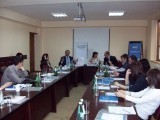FOI Trainings
Implemented
Freedom of Information in Law Enforcement Bodies
23.03.2011

With the financial support of USAID on 19-20 March, 2011 “Freedom of Information Center of Armenia” organized a working discussion in Aghveran with the topic “Peculiarities of Freedom of Information in Law Enforcement Bodies”. Journalists, and 20 employees of Prosecutor’s Office, Police, Ministry of Defence, and the Justice system took part in the discussion.
Head of the Department on Crimes against Human Rights at the General Prosecutor's Office Arthur Davtyan introduced the Armenian and international legal environment related to the opportunities for receiving information. He also talked about relations that occur in the sphere of publishing crime procedures and outcomes. “Every member of the society is interested and has the right to be informed about these procedures. And every trial subject in these procedures has a right for respect towards his personal and family life,” stated A. Davtyan, adding that in the context of this contrast the necessity of the confidentiality of the preliminary investigation is not less important, which makes the complexity of the issue more obvious. On this matter a heated discussion evolved between the journalists and representatives of law enforcement bodies. Journalists complained that often law enforcers do not give information, saying that it has to do with the confidentiality of the preliminary investigation. However, this is not always justified. Representatives of law enforcement systems, in their turn, mentioned that there are several details, which do require confidentiality for the investigating body. As a solution of the issue they suggested that a guiding document be created, defining when not providing information may be reason of the confidentiality of the preliminary investigation.
In her speech Ruzan Minasyan, responsible for the legal section of “Aravot” daily, talked about the practice of getting information from law enforcement bodies.
Journalists agree to present the answers from official sources parallel to information received from other sources. However, they see a problem here – the copyright of the topic, the uniqueness of the material obtained by the journalist is lost, because often the answers are disseminated through press releases. The speaker found this working style unacceptable, because “media outlets are competing with each other to be first in acquiring information. Also, by having certain information, journalists endanger the source, for it only trusted the information to that specific media outlet.” However, the press secretaries present at the meeting have their own viewpoint about the matter – the answer of the inquiry has public importance, thus, it is not possible to give that information to only one journalist.
Chief of the Department of Public Affairs of the ARM GOV Police Ashot Aharonyan talked about freedom of information and crime coverage. “In the context of crime coverage, the pre-prevention and prevention of crimes is very important,” stated the speaker, talking about the peculiarities of freedom of information in the police system. A. Aharonyan also talked about due process of law, “With the aim to assure due process of law, unclear letters, closed faces and changed voices are used.”
Head of the Public Affairs branch of the Penitentiary Department of the ARM Ministry of Justice Arsen Babayan talked about “Freedom of Information in the Penitentiary System, Journalistic Activities and their Issues”. A. Babayan presented the statistics of information inquiries from them, stating that the more people turn to them the less disinformation is disseminated by the media. “Behind every convict stands a victim. So, we should not forget about victims when preparing publications. When journalists talk about the good living conditions of convicts, almost always victims complain,” noticed A. Babayan, when talking about the peculiarities of their system. Journalist of “Aravot” daily Ruzan Minasyan recalled a case, when their newspaper had published an article about the hospital for convicts, where the bathroom was renovated and conditions were improved. On the next day the parents of soldiers in a military detachment near this hospital complained, saying that the living conditions of convicts are better than those of soldiers.
A. Babayan informed that they provide information for journalists and citizens through all means of communication. There even was a case when through “facebook” a citizen complained A. Babayan about the Penitentiary Department. Mr. Babayan processed the case and gave a notice to those guilty.
The working discussion was quite active. Journalists expressed all their dissatisfactions and remarks about working with law enforcement bodies and received answers from the representatives of relevant bodies. At the end of the meeting the participants were satisfied, because “such meetings allow communicating with officials in a freer environment, which later promotes the work, from a viewpoint of trust and cooperation.
Chief of the Department of Public Affairs of the ARM GOV Police Ashot Aharonyan noticed that “barricades” between journalists and the police disappear due to such meetings. Press secretary of the Minister of Justice Karine Kalantaryan was also satisfied with the working discussion, because “it allowed listening to the journalists’ remarks, which will help in making the future work more effective.” Head of the Public Affairs branch of the Penitentiary Department of the Ministry of Justice Arsen Babayan also assessed the working discussion as effective. “It was very important that both journalists and officials were present at the discussion. Both sides expressed their questions out loud, which will make the cooperation more effective. Such meetings also form a mutual trust.”
Head of the Department Providing Support Services to Prosecutors of the ARM General Prosecutor’s Office Shahen Tonoyan suggested developing criteria for providing preliminary investigation information, which would define the public interests and convicts’ rights.
Participants also suggested that a guideline be developed for providing information for those structures, which have certain peculiarities for providing information. Also, it was suggested that suchlike discussion be organized in a topic “Preliminary Investigation Secrets”, as well as a meeting be organized with employees of MoD information service.